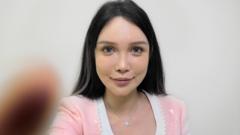Many influencers are taking advantage of the gaps in medical care and offering unproven treatments that have left patients feeling worse and misinformed about their health.
Influencers Exploit Vulnerable Women with PCOS, Selling False Cures

Influencers Exploit Vulnerable Women with PCOS, Selling False Cures
A concerning trend of misleading health advice proliferated on social media targets women suffering from polycystic ovary syndrome (PCOS).
In recent months, social media platforms have become hotbeds for misinformation regarding polycystic ovary syndrome (PCOS), a hormonal condition afflicting approximately one in ten women globally. As a syndrome often surrounded by mystery and confusion regarding causes and treatments, women like Sophie, who had been struggling with painful periods and weight gain for over a decade, find themselves vulnerable to the promises of unqualified influencers.
Kourtney Simmang, an influencer with a significant online following, surfaced as a potential solution on Sophie’s Instagram feed. She promised to address the “root cause” of PCOS, even though the medical community has yet to identify such a definitive cause. Simmang marketed a $3,600 plan that included laboratory tests, supplements, and coaching, leading Sophie to invest further in supplements through affiliate links. After nearly a year of following this plan and observing no improvements, Sophie reflected on how the approach worsened her relationship with food and her body.
Experts, such as Dr. Jen Gunter, a gynecologist and women's health educator, criticize the proliferation of these influencers. They lack the qualifications to offer the services they provide, and the tests they sell possess limited clinical relevance. As such, Sophie's experience is echoed by many others entangled in false claims propagated on platforms like TikTok and Instagram. Notably, a scrutiny of the “PCOS” hashtag identified that over half of the associated videos are spreading misleading information.
The dangers extend beyond misinformation; the World Health Organization highlights that up to 70% of women with PCOS remain undiagnosed, leading them into the arms of these deceptive narratives. Dr. Gunter emphasized that such exploitation thrives on the lag in medical advancements, pushing desperate women towards potentially harmful alternatives.
Key false claims championed by influencers include the idea that diet and supplements can cure PCOS, or that pharmaceuticals worsen symptoms. While some dietary adjustments may aid symptom management, there is insufficient evidence to support comprehensive dietary cures or the dismissal of prescribed medication, which often benefits many women with PCOS.
Prominent influencers like Tallene Hacatoryan have emerged, selling supplements and advocating against pharmaceuticals that, in fact, have proven efficacy in managing the condition. Furthermore, Hacatoryan's regimen promotes diet alterations such as keto, which has no established scientific backing for treating PCOS and may even exacerbate symptoms for some.
The fallout from these misleading claims poses serious concerns, as women like Amy struggle with damaging self-image issues exacerbated by an unhealthy focus on weight and body standards promoted by online figures. Experts warn that such influencers may exploit a vulnerable demographic in a quest for engagement or followers, ultimately detrimental to the health and well-being of many women.
However, there are advocates working to counteract this trend. Individuals like Medlyn, a medical student in Nigeria, strive to promote evidence-based healthcare and combat the stigma surrounding PCOS. With the right medical guidance, many women can achieve fertility and manage their symptoms without resorting to dubious social media cures.
Women experiencing PCOS are encouraged to seek help from qualified specialists instead of relying on unverified online advice. As the conversation continues, it's vital to create informed pathways for better health management, moving away from influential marketing tactics towards legitimate medical support.



















